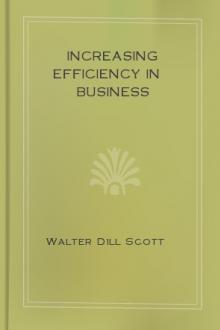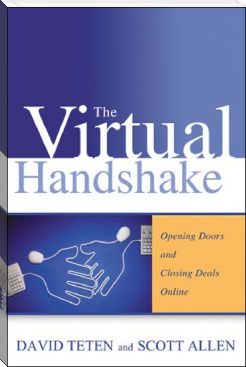Increasing Efficiency In Business, Walter Dill Scott [best novels for teenagers .TXT] 📗

- Author: Walter Dill Scott
- Performer: -
Book online «Increasing Efficiency In Business, Walter Dill Scott [best novels for teenagers .TXT] 📗». Author Walter Dill Scott
I’m not near so tired as usual either.”
_A successful day is likely to be a restful one,
an unsuccessful day an exhausting one. The
man who is greatly interested in his work and
who finds delight in overcoming the difficulties
of his calling is not likely to become so tired as
the man for whom the work is a burden_.
<p 168>
The experience related summarizes the
experience of every worker who has studied,
either on his own initiative or at some other’s
instance, the effect upon output secured by
the removal of distressing or displeasing conditions
from the workroom.
The man who has been engaged in intellectual
or manual labor finds himself more or less
exhausted when the day’s work is done. The
degree of exhaustion varies greatly from day
to day and is not in direct proportion to the
amount of energy expended or the results
attained. A comparatively busy day may
leave him feeling fresh, while at the end of a
day much less occupied he may be utterly
“dragged out” and weary.
Some men habitually find themselves fatigued,
while others ordinarily end the day
with a feeling of vigor. These contrary
effects are not necessarily due primarily
to disparity in the amount of energy spent
or to unequal stores of energy available.
The discrepancy in many instances is due to
diverse attitudes toward the work or varying
<p 169>
degrees of success which has attended the
work.
Pleasure secured in and from work is the
best preventive and balm for tired muscles
and jaded brains. Dislike or discomfort, on
the other hand, adds to toil by sapping the
strength of the worker.
Victory in intercollegiate athletic events
depends on will power and physical endurance.
This is particularly apparent in football.
Frequently it is not the team with the
greater muscular development or speed of
foot that wins the victory, but the one with the
more grit and perseverance. At the conclusion
of a game players are often unable to walk from
the field and need to be carried. Occasionally
the winning team has actually worked the
harder and received the more serious injuries.
Regardless of this fact, it is usually
true that the victorious team leaves the
field less jaded than the conquered team.
Furthermore the winners will report next day
refreshed and ready for further training,
while the losers may require several days to
<p 170>
overcome the shock and exhaustion of their
defeat.
Recently I had a very hard contest at tennis.
Some hours after the game I was still too tired
to do effective work. I wondered why, until
I remembered that I had been thoroughly
beaten, and that, too, by an opponent whom I
felt I outclassed. I had been in the habit of
playing even harder contests and ordinarily
with no discomfort—especially when successful
in winning the match.
What I have found so apparent in physical
exertion is equally true in intellectual labor.
Writing or research work which progresses
satisfactorily leaves me relatively fresh;
unsuccessful efforts bring their aftermath of
weariness.
_Intellectual work which is pleasant is stimulating
and does not fag one, while intellectual
work which is uninteresting or displeasing is
depressing and exhausting_.
We can readily trace the source of energy
in mechanical devices. The hands of a clock
continue in their course because of the energy
<p 171>
locked up in a compressed spring or elevated
weight. The gun projects the bullet because
of the sudden chemical union of carbon with
saltpeter and sulphur. The steam engine
takes its energy from the steam secured by
combustion of coal or other fuel.
The work of the human organism is usually
classified as muscular or intellectual. In
either the expenditure of energy is as dependent
upon known causes as is the activity
of the mechanical devices mentioned
above.
Every muscular activity is dependent upon
muscular cells ready for combustion; without
such combustion no muscular work is
performed.
Every intellectual process is likewise dependent
upon brain cells ready for combustion,
and no intellectual work can be performed
without combustion of these brain cells.
To secure continued activity the clock must
be rewound, the gun must be recharged, more
coal must be supplied to the engine. In like
manner the continuation of muscular and in-
<p 172>
tellectual activity depends upon the restoration
of muscle and brain cells. The necessity
for renewal is greater or less according to the
amount stored in reserve and the rapidity of
consumption. A maximum head of steam
may keep the engine running for a long time
unless the load is too heavy or the speed too
great. Though under certain conditions the
amount of muscle and brain energy stored in
reserve is large, continuous or rapid activity of
necessity expends the reserve and leads to
exhaustion.
It is a simple process to rewind the clock,
to reload the gun, and to replenish the fuel.
To restore muscular and nerve cells is a very
delicate process. So wonderful is the human
organism, however, that the process is carried
on perfectly without our consciousness or
volition except under abnormal conditions.
Food and air are the first essentials of this
restoration. Indirectly the perfect working of
all the bodily organs contribute to the process
—especially deepened breathing, heightened
pulse, and increase of bodily volume due
<p 173>
to the expansion of the blood vessels running
just beneath the skin.
_Here pleasure enters. Its effect on the expenditure
of energy is to make muscle and brain
cells more available for consumption, and particularly
to hasten the process of restoration or
recuperation_.
The deepened breathing supplies more air
for the oxidation of body wastes. The heightened
pulse carries nourishment more rapidly
to the depleted tissues and relieves the tissues
more rapidly from the poisonous wastes
produced by work. The body, the machine,
runs more smoothly, and fewer stops for repairs
are made necessary.
In addition to these specific functions,
pleasure hastens all the bodily processes which
are of advantage to the organism. The hastening
may be so great that recuperation keeps
pace with the consumption consequent on
efficient labor, with the result that there is
little or no exhaustion. This is in physiological
terms the reason why a person can do more
when he “enjoys” his work or play, and can
<p 174>
continue his efforts for a longer period without
fatigue. The man who enjoys his work requires
less time for recreation and exercise, for
his enjoyment recharges the storage battery of
energy.
Not only can I endure more and achieve
more when I take pleasure in the task, but I
can also secure better results from others by
providing for their interest and for their pleasure
in what they are doing. This is a fact
which wise merchants and employers have
felt intuitively, but in most instances the
principle has not been consciously formulated.
High-grade stores do much to add to the pleasure
of their customers. Every resource of art
and architecture is employed to make store
rooms appeal to the <ae>sthetic sense and the
appreciation of customers. Clerks are instructed
to be obliging and courteous. Employees
are not allowed to dress in a style
likely to offend a customer and they are
schooled in manners and in speech. Space
is devoted to the convenience and comfort
of customers.
<p 175>
_The most successful establishments in the
world are the ones which do most to please their
patrons—not by cutting prices or simply by
supplying better goods, but by expediting and
making more pleasant the purchase of goods_.
They have discovered that customers inducted
into a beautiful shop and surrounded
by tactful obliging clerks are more willing to
buy and are more likely to be satisfied with
what they purchase. By adding to their patrons’
comfort and pleasure they are able to
accomplish more than by any other selling
argument. In like manner, restaurants and
hotels have learned that splendid rooms, flowers,
spotless linen, well-dressed and courteous
waiters, good furniture, and so on, all attract
customers and induce them to order more
generously.
Lawyers find in trying cases that it is quite
essential to regard the mood of clients, juries,
and judges. The pleased man is not suspicious;
he does not hesitate in coming to a conclusion,
and he is not likely to impute evil
motives to the actions of others. As has been
<p 176>
well said by Dickens, when speaking from the
viewpoint of the defendant, “A good, contented,
well-breakfasted juryman is a capital
thing to get hold of. Discontented or hungry
jurymen always find for the plaintiff.”
The salesman with a pleasing personality
is able to sell more goods than others less
happily endowed. Some salesmen try to supplement
this power—or supply the lack of a
pleasing personality—by “jollying” the possible
customer in various ways. Dinners,
theaters, cigars, and various other devices
are thus used, and in many instances with success.
Modern business employs such methods less
and less, chiefly because the customer recognizes
the purpose of the attempt, and either
refuses to accept the “hospitality” or is on
his guard to resist the effect. A pleasing
personality, however, inspires confidence, tends
to put the customer in a good humor and optimistic
mood, and results in sales.
A cold, formal manner, ill temper, or a
pessimistic outlook, on the contrary, will
<p 177>
handicap the sale of the best merchandise
made.
A man is said to be suggestible when he
comes to conclusions or acts without due
deliberation. Suggestion, then, is nothing but
the mental condition which causes us to believe
and respond without the normal amount
of weighing of evidence. While in a suggestible
condition we are credulous, responsive,
and impulsive. Such a mental condition is
favored and induced by pleasure. Discomfort
or dissatisfaction with the conditions or
surroundings prompts the opposing attitude;
we become suspicious and slow to act or believe.
While in a suggestible condition, we
place our orders freely and promptly. The
merchant who can please his customers and
bring them to a suggestible mood before he
displays his wares, therefore, has done much to
secure generous sales.
Advantageous results from suggestion are
not limited to the relationship between buyer
and seller.
The pleased and satisfied employee is open
<p 178>
_to the suggestions of foreman and manager and
responds with an enthusiasm impossible of
generation in one dissatisfied from any cause_.
Methods of insuring this pleasure in work
for employees are yet in the formative stage.
Until recently the want of such methods, indeed,
was not felt. The slave driver with the
most profane vocabulary and the greatest
recklessness in the use of fist and foot was
supposed to be the most effective type of boss.
The task system set an irreducible minimum
for the day’s work; the employer exacted the
task and assumed that no better way of handling
men could be devised. Piecework rates
provided a better and more reasonable basis
for securing something like a maximum day’s
work; bonus and premium systems have carried
the incentive of the wage in increasing efficiency
to the last point short of co<o:>perative
organization. But all of these systems fall
short in assuming that men are machines;
that their powers and capacities are fixed quantities;
that the efficiency of a well-disposed and
industrious employee ought to be proof against
<p 179>
varying conditions or environment; that a
man can achieve the desired standard, if only
he has the will to achieve it.
_Discipline has become less brutal if not less
strict. The laborer works, not alone to avoid
poverty and hunger, but to secure the means of
pleasure_.
It is not so long since harsh discipline was
common both in homes and in business. The
boy worked hard because





Comments (0)